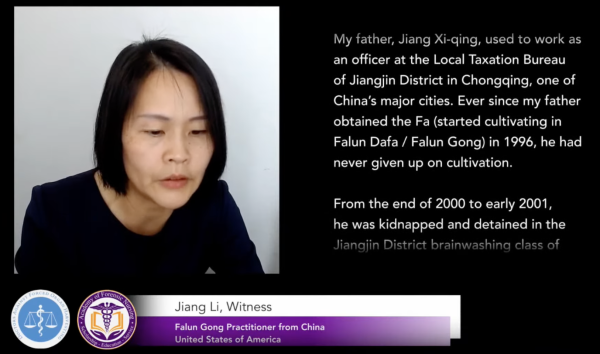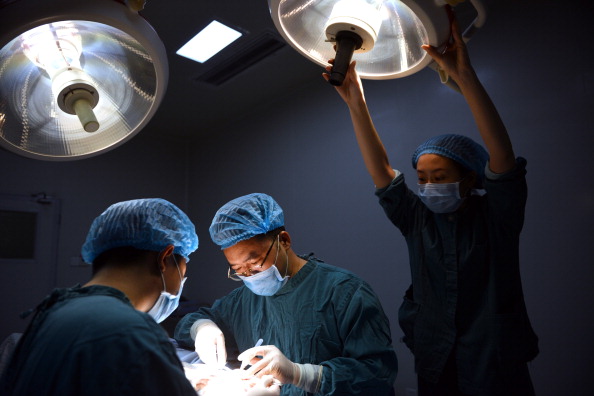For decades now, Chinese authorities have boasted of their country’s booming transplant industry — which they claim will soon surpass Western medicine in affordability, availability and ease.
However, according to research conducted by a growing number of leading experts in this field, China’s transplant industry also involves a much darker, sinister, and often illegal side to it.
This research was highlighted at the Universal Declaration on Combating and Preventing Forced Organ Harvesting (UDCPFOH) webinar brought forth by five non-profit organizations, academics and human rights activists gathered to bring renewed awareness to the practice of organ harvesting at the hands of the Chinese Communist Party (CCP).
MORE ON CHINA’S ORGAN HARVESTING PRACTICE:
- New Report Shows Chinese Doctors Used Organ Harvesting as a Method of Execution
- Another Witness Comes Forward to Expose Forced Organ Harvesting in China
- Chinese Regime Harvests Over 150,000 Organs From Jailed Prisoners Each Year: Expert
- Child and Bride Trafficking in China Linked to Organ Harvesting: Activist Report
“Harvesting organs for transplantation from living people — it’s not only a violation of nursing, and medical ethics and basic human rights, but it’s a crime against humanity,” Deborah Collins-Perrica — director of nursing affairs at Doctors Against Forced Organ Harvesting (DAFOH) — a Washington-based advocacy group that co-organized the event, told The Epoch Times.
The virtual event, which took place on Nov. 1 from 10 a.m. to 2 p.m. EST, discussed the overwhelming evidence of how the CCP employs different tactics to target, kill, and harvest organs from prisoners of conscience and ethnic minorities.
Success
You are now signed up for our newsletter
Success
Check your email to complete sign up
Ethan Gutmann, senior research fellow at the Victims of Communism Memorial Foundation and co-author of landmark works on the subject, “Bloody Harvest” and “The Slaughter” — shared during the webinar that he believes the CCP may be targeting and killing as many as 50,000 concentration camp victims each year in order to sell their organs.

In his research, Gutmann noted that each healthy individual murdered for their organs could yield two or three organs — meaning the Chinese regime could be selling as many as 150,000 organs from these victims each year. Most of the organs are then sold to local and foreign customers who wish to bypass much higher costs and long wait times in the U.S. or Europe.
Falun Gong adherents
Through a vast collection of circumstantial evidence and first-hand accounts, common targets of organ harvesting have been found to be Falun Gong practitioners and members of China’s Uyghur Muslim minority.
Falun Gong, also known as Falun Dafa, is a traditional Chinese spiritual discipline first introduced to the public in 1992 by Mr. Li Hongzhi. Since then, the practice has been embraced by tens of millions of people in China and around the world for its health benefits and emphasis on the improvement of character and moral conduct.
In July 1999, the Chinese regime began a massive campaign to eradicate the popular faith, incarcerating millions of people over the following decades. Thousands of Falun Gong practitioners have since died from torture and abuse, with the number still on the rise. Many Falun Gong followers have also been subject to relentless harassment, arrests and arbitrary imprisonment.
Notably, the Chinese organ transplantation industry shot up in the years directly following the start of the persecution. Later investigation and testimonies have linked the Chinese transplant industry with the mass murder of Falun Gong practitioners.
Ning Shi, a practitioner from China, shared during the webinar that after being “caught practicing Falun Gong exercises in a park,” she was sent to a concentration camp where she witnessed people disappearing from one day to the other — presumably murdered for their organs.
Jiang Li, another practitioner who now resides in the U.S., shared how her father Jiang Xi-Qing endured harrowing torture and abuse at the hands of Chinese police for refusing to give up his faith in the practice. After being held in a detention center in Chongqing for one month in 2001, he was fired from his job as a government official in Jiangin’s District Tax Bureau.
In 2009, the elder Jiang died from “unnatural causes” after being detained again for practicing Falun Gong. “They harvested his organs and cremated his body,” Jiang Li said, adding that the family never consented to the cremation.

Readily available
By comparison, in the U.S., the average wait time for a kidney is 5 years, 11 months for a liver and 6 months for a lung. According to organ donation statistics, a new patient is added to the transplant list every 9 minutes. There are currently over 100,000 people in need of an organ transplant — with 17 individuals dying everyday while awaiting a life-saving organ.
In China, however, a patient can undergo surgery in as little as a few weeks once an organ is procured. Cai Shenkun, an expert on China issues said during the webinar that the surge in organ transplantation can likely be attributed to the “perception of low-priced Chinese goods, relatively low surgical costs,” and how “easy and fast” it is to obtain them.
Arthur Caplan, PhD fellow from NYU’s Pantone Medical Center, echoed Cai’s sentiments, underscoring how the sinister practice has reached new heights in recent years.
Although the Chinese Communist Party (CCP) has claimed on various occasions that “heinous practices” such as human trafficking and illegal organ harvesting must be “punished with severity, speed, and zero tolerance,” the statements are usually seen as empty gestures merely said to appease human rights activists and the public.
Speaking out against the government comes at a great risk in the authoritarian country and the Chinese regime has a long track record of arresting, imprisoning and even torturing activists and human rights attorneys for raising issues that paint the Party in a negative light.
Thousands of activists have since been arrested and charged under “crimes of subversion” since the CCP was established in 1949. For many, their fates remain unknown.














